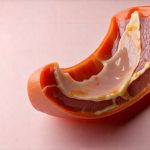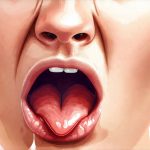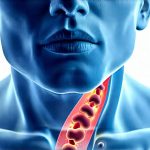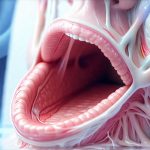Gastroesophageal reflux disease (GERD) is a surprisingly common condition affecting millions worldwide, often manifesting as heartburn, regurgitation, and difficulty swallowing. However, its impact can extend far beyond these typical symptoms, subtly disrupting sleep and leading to unsettling experiences like the sensation of choking during the night. This isn’t necessarily about actual aspiration – where stomach contents enter the lungs – but a perception of airway obstruction stemming from refluxed acid irritating the esophagus and triggering protective reflexes. Understanding this link between gerd and sleep is crucial for those experiencing it, as it can significantly impact sleep quality and overall well-being. It’s important to recognize that these experiences warrant investigation and aren’t simply ‘just something you get used to’.
The discomfort associated with nighttime GERD isn’t always straightforward. While many associate reflux with a burning sensation in the chest, its effects can be more insidious when experienced during sleep. The body’s natural defenses are somewhat diminished while we rest, making us less aware of minor irritations that might prompt action if awake. Refluxed stomach acid can irritate the vagus nerve, which plays a role in airway protection, leading to coughing, throat clearing, and – critically – the feeling of something obstructing your breathing. This is often mistaken for choking, even though actual aspiration isn’t occurring. The combination of these factors explains why many individuals report waking up suddenly with a gasp or a panicked feeling of suffocation.
Understanding the Connection Between GERD and Nocturnal Choking Sensations
The relationship between GERD and nighttime choking sensations is complex and multifactorial, not simply a direct cause-and-effect scenario. Several physiological changes occur during sleep that can exacerbate reflux and increase the likelihood of these distressing experiences. Firstly, when we lie down, gravity no longer assists in keeping stomach contents where they belong. This allows acid to more easily flow back up into the esophagus. Secondly, lower esophageal sphincter (LES) tone – the muscle that prevents stomach acid from entering the esophagus – tends to relax during sleep, further facilitating reflux. Finally, our awareness of discomfort is reduced while asleep, meaning we’re less likely to notice minor symptoms and react accordingly until they become significant enough to wake us up, often as a choking sensation.
The type of food consumed before bed can also play a substantial role. – Fatty foods – take longer to digest and increase acid production. – Spicy foods – irritate the esophageal lining and can weaken the LES. – Caffeine and alcohol – both relax the LES, making reflux more likely. Lifestyle factors such as obesity, smoking, and certain medications (like calcium channel blockers or nitrates) can also contribute to GERD symptoms and potentially worsen nocturnal choking sensations. It’s not just about what you eat but when you eat; allowing at least 2-3 hours between your last meal and bedtime is generally recommended. Considering sleep and digestion can help make better choices before bed.
Importantly, the sensation of choking isn’t always caused by acid reflux alone. Other conditions can mimic these symptoms, making accurate diagnosis crucial. Conditions like sleep apnea – where breathing repeatedly stops and starts during sleep – can also create a feeling of suffocation and be mistaken for GERD-related choking sensations. This is why consulting with a healthcare professional is essential to determine the underlying cause and receive appropriate treatment. Differentiating between true aspiration (a medical emergency) and a perceived choking sensation due to reflux requires careful evaluation.
Diagnostic Approaches & Identifying the Root Cause
Pinpointing the source of nocturnal choking sensations requires a comprehensive approach that goes beyond simply self-diagnosing GERD. A healthcare provider will likely begin with a detailed medical history, asking about your symptoms, dietary habits, medications, and any relevant family history. This is often followed by one or more diagnostic tests to confirm a diagnosis and rule out other potential causes. – Endoscopy – involves inserting a thin, flexible tube with a camera into the esophagus to visualize the lining and identify any inflammation or damage. – Esophageal manometry – measures the pressure within the esophagus and assesses the function of the LES. – pH monitoring – either through a catheter placed in the esophagus or an implantable device, monitors the amount of acid reflux over a 24-hour period. If you suspect GERD with esophagitis, these tests are especially important.
Sleep studies (polysomnography) may also be recommended, particularly if sleep apnea is suspected. These studies monitor brain waves, heart rate, breathing patterns, and oxygen levels during sleep to identify any disruptions in breathing. It’s important to note that self-treating based on online information can be dangerous; accurate diagnosis by a qualified healthcare professional is paramount. The goal isn’t just identifying GERD but also determining the severity of reflux and whether complications like esophagitis or Barrett’s esophagus are present.
Once a diagnosis is made, treatment options can be tailored to your specific needs. This might involve lifestyle modifications (discussed below), medications to reduce acid production, or in more severe cases, surgical intervention to strengthen the LES. The key takeaway here is that the sensation of choking during sleep isn’t something to ignore; it’s a signal from your body that warrants investigation and appropriate medical attention.
Lifestyle Modifications for Managing GERD & Reducing Nocturnal Symptoms
Lifestyle adjustments often form the cornerstone of GERD management, particularly when aiming to alleviate nighttime symptoms like choking sensations. These modifications are relatively low-risk and can significantly reduce reflux episodes. – Elevate the head of your bed – by 6-8 inches using blocks or a wedge pillow. This utilizes gravity to help keep stomach acid where it belongs. – Avoid eating within 2-3 hours of bedtime – allowing sufficient time for digestion reduces the likelihood of reflux during sleep. – Limit trigger foods – such as fatty, spicy, and acidic foods, caffeine, alcohol, and chocolate. Identifying your personal triggers can be helpful.
Maintaining a healthy weight is also crucial, as obesity increases abdominal pressure, contributing to reflux. Smoking cessation is strongly recommended, as smoking weakens the LES and irritates the esophageal lining. – Regular exercise – promotes overall health and can aid in digestion but avoid strenuous exercise close to bedtime. – Smaller, more frequent meals – instead of large meals, which put more pressure on the stomach. These modifications require consistency to be effective. It’s not about eliminating everything you enjoy but making mindful choices that support your digestive health. Navigating employment during treatment can also add stress, so minimizing it is beneficial.
Medication & Further Interventions
When lifestyle changes aren’t enough to control GERD symptoms and reduce nocturnal choking sensations, medication may be necessary. Several types of medications are available, each working in a different way to address the underlying causes of reflux. – Antacids – provide quick, temporary relief by neutralizing stomach acid. However, they don’t address the root cause of the problem. – H2 blockers – reduce acid production in the stomach for a longer period than antacids. – Proton pump inhibitors (PPIs) – are the most potent acid-reducing medications and are often prescribed for more severe GERD cases.
It’s important to discuss the potential side effects of any medication with your healthcare provider before starting treatment. Long-term PPI use has been linked to certain nutritional deficiencies and other health concerns, so it’s essential to weigh the benefits against the risks. In rare cases where medications aren’t effective or complications arise, surgical intervention may be considered to strengthen the LES. Fundoplication is a common surgical procedure that involves wrapping the top of the stomach around the lower esophagus to prevent reflux. This is generally reserved for individuals with severe GERD who haven’t responded to other treatments. Remember, medication should always be prescribed and monitored by a qualified healthcare professional. If you are experiencing GERD without esophagitis, these interventions can still provide relief. Furthermore, during cold and flu season it’s important to follow tips for avoiding liver stress as this can exacerbate GERD symptoms. Finally, consider the connection between GERD and sleep apnea when seeking a diagnosis.


















